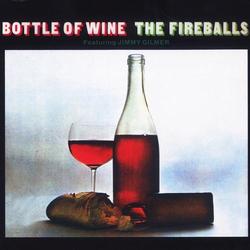"Fuzzy Memories"
Hits of yesteryear that the "Hits
and Memories" stations seem to have forgotten ...
"Bottle of Wine" by The Fireballs (Atco,
1967) -- #3 Australian hit, Feb. 1968
American rock'n'roll band The
Fireballs -- sometimes billed as Jimmy Gilmer
& The
Fireballs -- were very popular in the late 1950s and early
1960s,
and scored several US hits, although their popularity waned during the
Beatlemania years. After a five year absence from the charts, they
scored
a surprise comeback in early 1968 with the single
"Bottle of
Wine", which was a Top Ten hit for them in both America and Australia.
Formed in
Raton, New Mexico, the original 1958 lineup was George Tomsco
(lead guitar),
Chuck Tharp (vocals), Stan Lark
(bass), Eric Budd (drums), and Dan Trammell (rhythm guitar). The
Fireballs start out as an instrumental group,
featuring the distinctive lead guitar of Tomsco, and
they recorded
at Norman Petty's studio in Clovis, New Mexico, where Buddy Holly had
previously launched his career. They made the US Top 40 with
the
singles "Torquay" in 1959 and "Bulldog" in 1960. Tharp, Budd &
Trammell left the group in the early '60s, to be replaced by Doug
Roberts (drums) and Petty Studio solo vocalist-pianist
Jimmy Gilmer, who became the lead singer.
Now billed as Jimmy Gilmer & The Fireballs, the group scored a
#1 hit on the Billboard chart with "Sugar Shack", which remained at top
position for five weeks in 1963. It also reached #1 on Billboard's
R&B chart for one week in November of that year, but its run on
that chart was cut short because Billboard suspended publication of
its R&B chart from November 30, 1963 to January 23,
1965.
Nonetheless, "Sugar Shack" earned the group an RIAA Gold Record Award
for the top-sellng single 1963. Jimmy Gilmer & The
Fireballs
had another
pop hit in 1964 with a similar sounding "Daisy Petal Pickin'", which
reached #15 on the Hot 100.
Besides their own recordings, Petty
recruited the Fireballs as studio musicians for other recording artist
projects including folk singer Carolyn Hester and renowned
vocalist and songwriter Arthur Alexander, and Petty also used the group to add
instrumental backings to the Buddy Holly "apartment tapes", which
had surfaced after his death.
 The
Beatles scored their first US hits during the chart run of "Daisy
Petal Pickin' " and soon -- like so many other American acts -- The
Fireballs were soon finding it difficult to compete against
the 'British Invasion'. The Fireballs had no chart success for
the
next five years, but in 1967 they signed with
Atlantic's subsidiary Atco. The first single
for their
new label was a rollicking version of "Bottle of
Wine" (written by Tom
Paxton) which went to #9 on the Billboard
Hot
100.
The
Beatles scored their first US hits during the chart run of "Daisy
Petal Pickin' " and soon -- like so many other American acts -- The
Fireballs were soon finding it difficult to compete against
the 'British Invasion'. The Fireballs had no chart success for
the
next five years, but in 1967 they signed with
Atlantic's subsidiary Atco. The first single
for their
new label was a rollicking version of "Bottle of
Wine" (written by Tom
Paxton) which went to #9 on the Billboard
Hot
100.
"Bottle of Wine" was an even bigger hit in Australia. It
debuted at #27 on the Go-Set national chart in
the first week of February 1968, shot into the Top 5 in just four
weeks, and hovered there for over a month, peaking at #3, and charting
for
a total of 13 weeks. This was no mean feat, given that the song
was competing with hits such as Paul Mauriat's "Love is Blue",
Johnny
Farnham's "Sadie", The Small Faces' "Tin Soldier", The
Monkees'
"Daydream Believer" and The Beatles "I Am The Walrus" / "Hello
Goodbye".
Although Gilmer was still a member of the group, the
band was billed
simply as "The Fireballs" on this single.
The Fireballs next single, "Goin' Away" was a notable
early
excursion into country-rock, and it reportedly gained some
airplay in Sydney, although it was a radical departure from the
raucous party style of "Bottle of Wine".
They reportedly
also scored a minor hit in Perth with their
third Atco single, the excellent psych-tinged acoustic rocker "Come On,
React", released in late 1968.
Gilmer left in 1969
to pursue artist management and record production in Nashville. Drummer
Doug Roberts died in 1981. All of The Fireballs material has been
reissued on Ace Records (UK) and
Sundazed labels. The Fireballs continued performing with original
members George Tomsco, Stan Lark and Chuck Tharp until Tharp's
death (from cancer) in 2006. Jimmy Gilmer has returned
occasionally as lead
vocalist and this lineup continues to perform, as of 2007.
Sources: Wikipedia / Go-Set Australian charts / Fireballs
official website.
Thanks to
Frank Calabrese, John Gambrill and Brian Last for additional
information.
 The
Beatles scored their first US hits during the chart run of "Daisy
Petal Pickin' " and soon -- like so many other American acts -- The
Fireballs were soon finding it difficult to compete against
the 'British Invasion'. The Fireballs had no chart success for
the
next five years, but in 1967 they signed with
Atlantic's subsidiary Atco. The first single
for their
new label was a rollicking version of "Bottle of
Wine" (written by Tom
Paxton) which went to #9 on the Billboard
Hot
100.
The
Beatles scored their first US hits during the chart run of "Daisy
Petal Pickin' " and soon -- like so many other American acts -- The
Fireballs were soon finding it difficult to compete against
the 'British Invasion'. The Fireballs had no chart success for
the
next five years, but in 1967 they signed with
Atlantic's subsidiary Atco. The first single
for their
new label was a rollicking version of "Bottle of
Wine" (written by Tom
Paxton) which went to #9 on the Billboard
Hot
100.